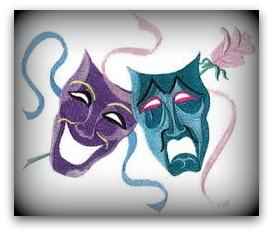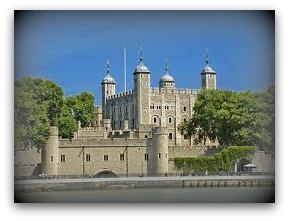 Perhaps many of you will have heard that there is a sort of controversy over Shakespeare’s authorship of the plays. I shouldn’t really describe it as a controversy because it isn’t, or it shouldn’t be; a controversy exists when there is some doubt about one side of an argument, when there are two sides to an argument and no matter how tenuous one side is, there is some substance to it. Over eighty alternative authors have been put forward for alternative authorship; they have one thing in common: there is not a scrap of evidence for any of them.
Perhaps many of you will have heard that there is a sort of controversy over Shakespeare’s authorship of the plays. I shouldn’t really describe it as a controversy because it isn’t, or it shouldn’t be; a controversy exists when there is some doubt about one side of an argument, when there are two sides to an argument and no matter how tenuous one side is, there is some substance to it. Over eighty alternative authors have been put forward for alternative authorship; they have one thing in common: there is not a scrap of evidence for any of them.
This is a subject that, since I became aware of it, has made me quite angry. I have tried to ignore it, but it always creeps back; you see even the ‘Does it matter’ arguments are annoying. Of course it matters. I shall try, briefly, to explain.
Apparently, doubt as to the authorship of his works began in the mid-nineteenth century, well over 200 years after his death. Friends and colleagues of his time had no doubt about his identity; they worked and socialised with him; Ben Johnson said of him that he
‘never blotted a line, would that he had blotted a thousand’.
It seems to have taken rather a long time for people to question his identity. A paucity of evidence from his life has helped, giving doubters ammunition to invent and speculate, but despite the paucity there is ample evidence that he was the author of the works. It takes a rather strange mind to doubt it. Unfortunately, especially now, there are plenty of strange minds around. And, I repeat (it can’t be repeated too often), there is not a scrap of evidence for anyone else having written his works. None whatsoever.
This poses the question as to why there are doubters. If we discount those always keen on any conspiracy theories and those with a vested interests (often lawyers), we are left with a relatively small bunch who simply refuse to believe that Shakespeare wrote his own plays. This is important; it is not that they truly believe any alternative, although they profess to do so, it is that they merely refuse to believe the truth. There is a reason for this: it is called snobbery.
The most popular fantasy today is that the Earl of Oxford wrote the plays, supposedly because only an aristocrat could have known so much about court behaviour, Italian history and poetry. As Bill Bryson has observed, this does make it rather difficult for him to have written Othello, King Lear, Macbeth, Antony and Cleopatra, The Winter’s Tale, The Tempest and many others, on account of being dead. But his champions merely point out that there was a conspiracy and evidence was falsified to protect Oxford’s identity. Why it needed to be protected or why it has taken nearly 400 years to discover this, does not seem to concern them. The Oxfordians have some quite well-known followers, Jeremy Irons, Vanessa Redgrave, Derek Jacobi and Mark Rylance among them.
The fact that there is any controversy at all is extremely irritating, indeed US writer James Shapiro felt the need to write a recent book, Contested Will, to try and end the argument once and for all. It would have been much better had he used his time more productively – he is a marvellous writer on Shakespeare generally – but felt compelled to write on this topic when an 8 year old in his class expressed doubts as to the authorship (the debate, of course, is quite popular in America). I’m afraid that, having reached America and the lawyers and the film makers, even Shapiro’s excellent book will not make the doubters disappear. Although very much a minority, they are vociferous and probably growing. A film with Vanessa Redgrave and Derek Jacobi has already been made. Thankfully, it was awful.
But back to snobbery. Shakespeare has been described as looking like a ‘self-satisfied pork butcher’; he liked money; he hoarded grain; he lent money; he bought a coat of arms and a new house (called New Place) in Stratford. He was far from both the aristocracy and the poor, grammar school educated (a classical education) and with a father on the wrong side of the law. All this is too much for those who need him to be a bit more refined, a bit more superior, a bit more above everybody else. Pork butcher? Money lending? Hoarding grain? A criminal father? No, we can’t have that.
This is where the snobbery comes in. The likes of Irons, Jacobi and Redgrave need to have the author of such wonderful works as somebody a little better than them. Having never struggled to pay a bill, never struggled with anything really, they can’t accept that an ordinary boy from Stratford could be so much smarter than they are, be so wiser than they are – be so utterly brilliant. So they have to believe that it was really an aristocrat who wrote the plays; lacking any evidence for anybody, other than an aristocrat who happened to be dead when many of the plays were written, they cling desperately to an illusion. What awful, silly people they must be.
 Shakespeare was so brilliant, so good, partly because he wasn’t a member of the aristocracy, wasn’t tainted by privilege and received ideas. He hadn’t been brainwashed by a university education. He was real and he knew people. He lived among them in London, he visited pubs and brothels; he knew and understood life. He is one of us, one of the people – he is ours. That is what the likes of Jacobi cannot abide. They have to try and raise Shakespeare above us. They simply cannot stand the fact that he was an ordinary person and, more importantly, that ordinary people are capable of being Shakespeare – that there may be another Shakespeare out there among the masses. They would have to admit that it was possible, that there is more possibility among the masses than their privileged upbringing and lack of brainpower allows.
Shakespeare was so brilliant, so good, partly because he wasn’t a member of the aristocracy, wasn’t tainted by privilege and received ideas. He hadn’t been brainwashed by a university education. He was real and he knew people. He lived among them in London, he visited pubs and brothels; he knew and understood life. He is one of us, one of the people – he is ours. That is what the likes of Jacobi cannot abide. They have to try and raise Shakespeare above us. They simply cannot stand the fact that he was an ordinary person and, more importantly, that ordinary people are capable of being Shakespeare – that there may be another Shakespeare out there among the masses. They would have to admit that it was possible, that there is more possibility among the masses than their privileged upbringing and lack of brainpower allows.
That is also why the question of authorship matters, that the greatest writer of all time was ordinary is very important. It should give inspiration to everybody. Allow these idiots to give the credit to an aristocrat and you rob the whole world of the possibility of great achievement. It matters.
I don’t have much space to go into the question of proof for Shakespeare’s authorship, I shouldn’t need to, but feel it necessary to mention a couple of things. The forest is a recurring theme in his plays. I quote from Peter Ackroyd’s biography:
“To the north of Stratford lay the Forest of Arden. When Touchstone enters the woods in As You Like It, he declares ‘I, now I am in Arden, the more foole I’. Shakespeare’s mother was Mary Arden. Anne Hathaway lived on the outskirts of the forest. His consciousness of the area was close and intense. The evidence of Shakespeare’s work provides evidence that he was neither born nor raised in the city. He doesn’t have the harshness of John Milton, born in Bread Street, nor the hardness of Ben Jonson, educated at Westminster School; the sharpness of Alexander Pope from the City or the obsessiveness of William Blake from Soho. He is of the country.”
On the question of snobbery I quote from an interview with Bill Bryson about his excellent short biography of Shakespeare:
Interviewer: Is it snobbery? He was a relatively ordinary man from a relatively ordinary background and they want him to be an aristocrat or somebody sort of special.
Bryson: That is really quite insulting to ordinary people. The idea that you could come from a modest background and that somehow that would disqualify you from being William Shakespeare is really a very demeaning thought. There’s no evidence for it. There never has been any evidence for it.
Oxfordians cannot explain Shakespeare’s knowledge of the country and its people. His knowledge of the cities came from living with them, his knowledge of Roman history from Plutarch. He was mainly an adaptor, he took other works and improved them. He wrote what are still some of the best parts for women, 400 years before feminism. He understood both men and women. He was modest; I’m sure he would be baffled by all the fuss about him today, although I’m sure he would take advantage of it.
Academics are generally very polite. In all the works stating (again) that the man from Stratford wrote the plays, they are very kind to the likes of Irons, Redgrave and Jacobi. They shouldn’t be; these people are a menace. They are snobs and idiots, too stupid to realise the damage they are causing. I suppose the best thing now would be to ignore them. I try to, but unfortunately they keep cropping up on television. It’s hard to see a solution.
To the Tower with them?

